
On this website I comment on my books, published in different countries and languages, thus, collating the appearance of my name and publications from various locations: Марина Григорьевна Рыцарева in Russian; Marina Rytsareva is the transliteration used in English libraries; and Marina Ritzarev is the transliteration of my name in Israel since 1990, and which I have used for my publications since 1997. My short biography and a list of principal publications can be found on my page on the Bar-Ilan University website: http://music.biu.ac.il/en/ritzarev.
 |
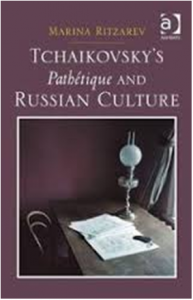 |
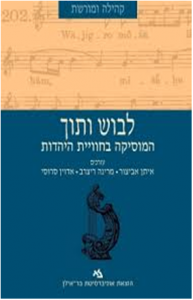 |
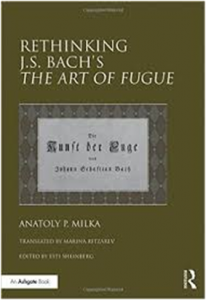 |
 |
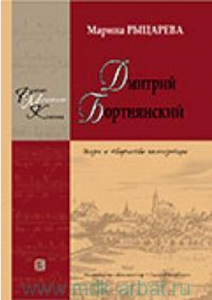 |
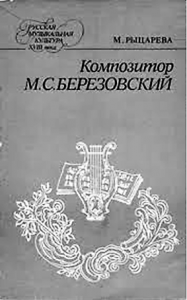 |
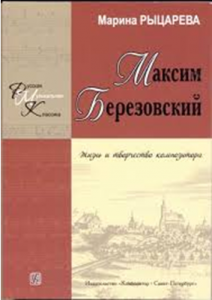 |
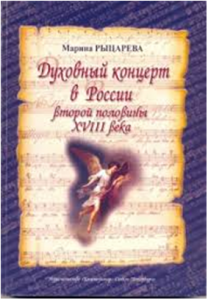 |
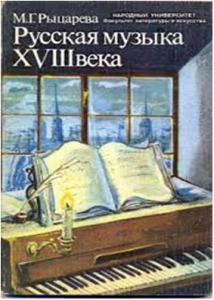 |
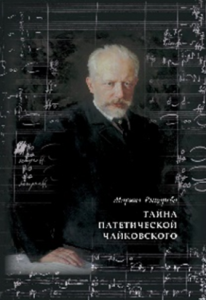 |
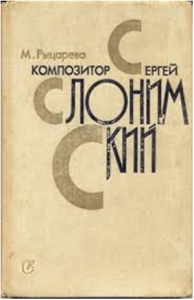 |
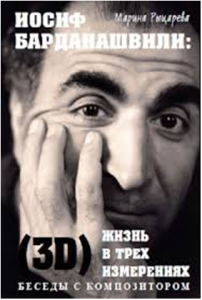 |
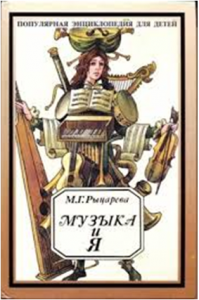 |
English Books
Eighteenth-Century Russian Music (Ashgate, 2006, 388 pp.; Routledge, 2006, 416 pp., Hardback, 2016 Paperback) ISBN-13: 978-1138249462; 9780754634669
https://www.routledge.com/Eighteenth-Century-Russian-Music/Ritzarev/p/book/9780754634669
Little is known outside of Russia about the nation’s musical heritage prior to the nineteenth century. Western scholarship has tended to the view that the history of Russian music did not begin until the end of the eighteenth century. Marina Ritzarev’s work shows this interpretation to be misguided. Starting from an examination of the rich legacy of Russian music up to 1700, she explores the development of music over the course of the eighteenth century, a period of especially intense Westernization and secularization. The book focuses on what is characteristic and crucial to Russian music during this period, rather than seeking to provide a comprehensive survey. The musical culture of the time is discussed against the rich background of social, political and cultural life, tying together many of the phenomena that used to be viewed separately. The book highlights the importance of previously marginalized sectors – serf culture, choral sacred culture, the contribution of foreign musicians, the significant influence of Freemasonry, the role of Ukrainian and West-European cultures and so on – as well as casting new light on the well-researched topic of Russian opera. leading eighteenth-century Russian composers, Maxim Berezovsky and Dmitry  Bortniansky, are provided, as well as those of the serf composer Stepan Degtyarev and the Italian Giuseppe Sarti. The book places eighteenth-century Russian music on the European map, and will be of particular importance for the study of European musical cultures remote from such centres as Italy, Germany-Austria and France. Eighteenth-century Russian music is organically linked with its past and future and its contributory role in forming the Russian national identity and developing the Russian idiom is clarified.
Bortniansky, are provided, as well as those of the serf composer Stepan Degtyarev and the Italian Giuseppe Sarti. The book places eighteenth-century Russian music on the European map, and will be of particular importance for the study of European musical cultures remote from such centres as Italy, Germany-Austria and France. Eighteenth-century Russian music is organically linked with its past and future and its contributory role in forming the Russian national identity and developing the Russian idiom is clarified.
Reviews: ‘Marina Ritzarev (Rytsareva) has been writing about eighteenth-century Russian music for several decades now, and this new book finally makes her labours available in comprehensive fashion to an English-language readership. The work is full of strengths, particularly in her mastery of the huge repertory and her equal and very welcome control of the complex archival holdings. … The book’s historiographical detours are among its strengths and surprises … The volume hits its stride in chapter 4, at mid-century, where the author begins her discussion of the crucial composer Maxim Berezovsky. This is where Ritzarev’s many years in the archives pay off and her confidence, authority, and ease of communication really come to the fore. The chapters focusing on the development of the concerto in the hands of both Russian and Western composers are particularly strong … (The) brief concluding section bristles with stimulating information, suggestions, and hypotheses…’ Music and Letters
‘… a valuable and very interesting book… There is a wealth of information in this book…’ Early Music Review
‘…Ritzarev’s book it is to be welcomed as an important major work by a major scholar. As an expert on Maksim Berezovskii and Bortnianskii (her many publications are included in the bibliography), Ritzarev is familiar with the relevant sources, has worked extensively in archives and is well placed to comment on existing critical approaches from both Russian and western perspectives …The book is enhanced by a large number of black-and-white illustrations and over a hundred musical examples…. Both Ritzarev and Ashgate are to be congratulated on having produced…a book that will satisfy and stimulate readers from a variety of scholarly backgrounds.’ Journal for Eighteenth-Century Studies
‘…a much awaited publication that fills up a large gap in the history of music… Ritzarev is also one of the world’s most knowledgeable, meticulous and yet remarkably interesting-to-read writers about Russian music in general…With the patience and pedantic conscientiousness of a real scholar she presents data collected by a vast array of former scholars – mainly from Russian sources that even today are not easily accessible to non-Russian speakers….Given the vast amount of historical detail and factual information provided in this book, it is almost surprising how interesting and easy to follow it is. Ritzarev is a gifted story-teller: she weaves anecdotal information into her historical narrative creating a story that seems to develop by itself…. The book is meticulous. Every detail mentioned is substantiated, referenced and reinforced by clear musical examples. Still, it never falls into becoming just a collection of informative details….One great merit of the book is the simplicity in which intricate stories are told. Ritzarev humanizes the story of Russian music, and brings it closer to us by emphasizing the human characteristics and constraints of her protagonists…Eighteenth-Century Russian Music is a wonderful, unique book about a period in a place about which we still know little…For the general reader it may provide a source of intellectual pleasure. For the scholar and student of Russian music it is an imperative, sine qua non source. No future writing on Russian music could ignore it.’ Ad Parnassum
‘This is the first book of its kind ever published in English: a long-overdue survey of Russia’s music and musical life in the 1700s…There are numerous musical examples from the works of Berezovsky, Bortniansky, Vedel, Degtyarev, Khandoshkin, Pashkevich, Fomin, and other Russian composers whose biographies are related in a refreshingly objective scholarly manner…an intriguing and absolutely essential reading for any Western student of Russian music, and particularly for those with limited access to the sources in Russian.’ The Russian Review
‘(There are) numerous fascinating nuggets of biographical detail provided by Marina Ritzarev in this long-awaited study of eighteenth-century Russian music….(it) is the only major English-language scholarly study of eighteenth-century Russian music that draws upon a wealth of both Russian and Western scholarship and archival resources….The only earlier book-length study in English was Alfred Swan’s Russian Music and its Sources in Chant and Folk Song (London: John Baker, 1973), one that scarcely scratches the surface of what Ritzarev has uncovered….To bring together a dazzling wealth of original archival research with a steadfast determination to challenge cherished myths and assumptions is a truly awesome task. … this pioneering book demands extremely careful reading before the threads connecting one goldmine of new information to the next can be properly perceived….If Ritzarev’s volume can begin the process of integrating eighteenth-century Russian music into international scholarship, the results could be truly spectacular…Russian scholars are waiting for the rest of the musicological world to join them in discovering more about a musical legacy that is crying out for greater attention. If such attention actually materializes, Ritzarev must take a large part of the credit.’ Eighteenth-Century Music
‘Ritzarev’s book is […] extremely important and will be an invaluable aid for future research.’ Early Music America
‘… an impressive comprehensive study richly illustrated with over a hundred comparative music examples.’ Slavic Review
‘Marina Ritzarev is known both to English and Russian scholars as one of the most insightful specialists in the music of eighteenth-century Russia…In this book, Ritzarev meticulously reconstructs the complicated infrastructure of musical life in Russia in the epoch between the death of Peter the Great (1725) and the renunciation of Alexander I (1825)…She also demonstrates that this period of Russian music cannot comprehensively be understood outside the context of Russian history and culture….The chapters on Berezovsky and Bortniansky…are most impressive, placing these composers in a wide historical and cultural context, and punctuated by apt music examples and analytical observations…a very impressive work. I use Marina Ritzarev’s book for my own research and teaching, and earnestly recommend it not only to my students but also to any scholar seriously interested in the history of Russian music.’ Min-Ad: Israel Studies in Musicology Online
Tchaikovsky’s Pathétique and Russian Culture (Ashgate, Routledge 2014, 2016, 188 pp.) Hardback ISBN: 9781472424112, Paperback ISBN: 9781138250345
https://www.routledge.com/Tchaikovskys-Pathetique-and-Russian-Culture/Ritzarev/p/book/9781472424112
Tchaikovskyʼs Sixth Symphony (1893), widely recognized as one of the worldʼs most deeply tragic compositions, is also known for the mystery surrounding its hidden programme and for Tchaikovskyʼs unexpected death nine days after its premiere. While the sensational speculations about the composerʼs possible planned suicide and the suggestion that the symphony was intended as his own requiem have long been discarded, the question of its programme rem ains. Tchaikovsky’s mention of the extreme subjectivity lying behind the work’s artistic concept has usually led scholars to seek clues to the programme in his inner emotional world, and some have mooted his homosexuality as the source of personal tragedy that may be at the work’s roots. In this close analytical and historical study, Marina Ritzarev argues that viewing a work of such outstanding aesthetic achievement solely as a personal lament is both unsatisfactory and inconsistent with Tchaikovskyʼs artistic ethics. She looks for the programme instead in the realm of European eighteenth- and nineteenth-century cultural values. Focusing her extensive knowledge of Russian culture on Tchaikovsky’s personal reading and social circle, she offers a startling new interpretation of this great work.
ains. Tchaikovsky’s mention of the extreme subjectivity lying behind the work’s artistic concept has usually led scholars to seek clues to the programme in his inner emotional world, and some have mooted his homosexuality as the source of personal tragedy that may be at the work’s roots. In this close analytical and historical study, Marina Ritzarev argues that viewing a work of such outstanding aesthetic achievement solely as a personal lament is both unsatisfactory and inconsistent with Tchaikovskyʼs artistic ethics. She looks for the programme instead in the realm of European eighteenth- and nineteenth-century cultural values. Focusing her extensive knowledge of Russian culture on Tchaikovsky’s personal reading and social circle, she offers a startling new interpretation of this great work.
Reviews: ‘The Russo-Israeli scholar Marina Ritzarev’s new study brings a stimulating new take on Tchaikovsky’s Sixth Symphony which the composer himself surrounded with an aura of secrecy … With commendable intellectual honesty she presents her subject as entirely an hypothesis, and whether one agrees with it or not, the undertaking was surely worthwhile for its bold thought-provoking engagement with this well-worn symphonic warhorse’. The Musical Times
‘The book offers a new, fresh angle, which, while safely grounded in factual and historical research into Russian culture, does not lose the imaginative and innovative touch that provides interest and excitement to the reading process. … Free from the shackles of pure positivism, she asks puzzling questions, and succeeds in providing quite convincing answers. She constructs a contextualized story. Her imaginative writing is not just let loose to run wild but, like a good detective story, is based on connecting small pieces of a large puzzle, creating a picture that is both convincing and entrancing, consistently and meticulously keeping a non-judgmental, curious, open-to-new-ideas approach. The result is fascinating. … She points at the deep admiration that Tchaikovsky felt toward the human figure of Jesus, proposing a program for the symphony: the story of the Passion of Christ. This is an extremely daring scheme of interpretation. Ritzarev lifts the gauntlet she had thrown to herself and, dedicating to it the second half of her book, engages in a meticulous and thorough description and analysis of the symphony, connecting the dots and attaching one piece to the other, forming a coherent picture of Tchaikovsky’s Sixth Symphony as a musical storytelling of the Passion.’ Min-Ad: Israel Studies in Musicology Online
‘Marina Ritzarev’s new interpretation of the symphony is just the latest attempt at solving the riddle and in many ways, it is an auspicious project. … Blessedly, Ritzarev dispenses with the disreputable notion that the symphony was a requiem for the composer himself, a musical suicide note written as he faced a scandal over an alleged affair with a young man with high connections. Rather, she argues that the work is an “artistic reflection of the Passion in symphonic form”. … Ritzarev’s interpretation is a potentially plausible one; it is certainly welcome for the way in which it moves beyond the kinds of psychosexual readings which have bedevilled too much writing on Chaikovskii.’ Slavonic and East European Review
‘This monograph offers a thoughtful and complex argument, replete with numerous insights into Petr Tchaikovskii’s work and the cultural environment in which he lived. … it is a welcome contribution to Tchaikovskii studies.’ Slavic Review
‘What she offers is indeed a daring act of hermeneutic, a rare one in musicology, grounded on an exegesis of the text and, above all, on an analysis of the historical context … her thorough study certainly provides a convincing set of arguments to found it. Before presenting analyses of every movement, the book offers some in-depth studies of the historical and cultural context of 19th-century Russia, a field where the author shows long lasting scholarship. An analysis of Tchaikovsky’s readings and of his relationship to the figure of Christ allow a well-grounded approach to this complex issue … it will become an indispensable piece of valuable musicology, with the stress on music – not only for all Tchaikovsky scholars and listeners, but also as a precious contribution to the field of musical signification’. Ad Parnassum
‘Ritzarev presents the Sixth Symphony as … a free interpretation of the life of Christ in an instrumental medium, breaking with official Orthodoxy like some of his contemporaries in the visual arts … Ritzarev’s reading of the symphony is not a straightforward narrative, but she does present specific episodes and argues that the combination of musical allusions results in a ‘semiotic field – a wholeness of elements – working to create an imagery belonging to the Passion’ (p. 52). The analysis of the first movement, which is compared to Christ’s agony in the Garden of Gethsemane, is the most interesting in this respect, offering comparisons with Bach’s St Matthew Passion and B Minor Mass, and suggesting a use of Baroque musical imagery that is worthy of serious attention … Ultimately, the book does make a convincing case for the relevance of religion in Tchaikovsky’s life and works and shows it to be a topic worthy of more attention, if only to produce a counterweight to the other themes that have so dominated the composer’s image’. Music & Letters
 Garment and Core: Jews and Their Musical Experiences, a collection of articles edited by Eitan Avitzur, Marina Ritzarev, Edwin Seroussi. Ramat-Gan: Bar-Ilan University Press, 2012, 400 pp. (in English and in Hebrew: לבוש ותוך: המוסיקה בחווית היהדות).
Garment and Core: Jews and Their Musical Experiences, a collection of articles edited by Eitan Avitzur, Marina Ritzarev, Edwin Seroussi. Ramat-Gan: Bar-Ilan University Press, 2012, 400 pp. (in English and in Hebrew: לבוש ותוך: המוסיקה בחווית היהדות).
http://www.biupress.co.il/website_en/index.asp?id=855
http://web.nli.org.il/sites/NLI/English/music/news/Pages/Levush.aspx
This volume includes studies that tackle ways in which Jews experience and conceive music both as individuals and as communities living in diaspora conditions. Negotiating the constitution of a Jewish self through music, within a wide variety of social and cultural non-Jewish milieus past and present, transpires as a thread interlacing these studies. The intriguing and rather unusual Hebrew title of the book, roughly translated as “Garment and Core”, has kabbalistic overtones and addresses the dialectic tension between form and content; between objective perception of the outside world and inner, or subjective, perception.
Translation
 Rethinking Bach’s the Art of Fugue by Anatoly Milka. Edited by Esti Sheinberg, translated by Marina Ritzarev. Abingdon, Oxon: Routledge, 2016. 262 pp. ISBN 9781472458865 https://www.routledge.com/9781472458865
Rethinking Bach’s the Art of Fugue by Anatoly Milka. Edited by Esti Sheinberg, translated by Marina Ritzarev. Abingdon, Oxon: Routledge, 2016. 262 pp. ISBN 9781472458865 https://www.routledge.com/9781472458865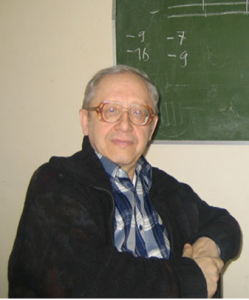
The enigmatic character of The Art of Fugue became apparent as early as in its first edition, printed more than a year after the composer’s death. Carl Philipp Emanuel Bach, who published both the first and the second editions, raised several unsolved questions regarding this opus. Anatoly P. Milka presents a consistent and  coherent solution to the unresolved questions about the history, structure and appearance of J.S. Bach’s The Art of Fugue, opening new perspectives for further exploration of this musical masterpiece. Milka challenges the present scholarly consensus that Anatoly Milka there exist two different versions of The Art of Fugue (the Autograph and the Original Edition) and argues that Bach had considered four versions, of which only two are apparent and have been discussed so far. Only Esti Sheinberg Bach’s illness and death prevented him from fulfilling his plan and publishing a fourth, conclusive version of his opus.
coherent solution to the unresolved questions about the history, structure and appearance of J.S. Bach’s The Art of Fugue, opening new perspectives for further exploration of this musical masterpiece. Milka challenges the present scholarly consensus that Anatoly Milka there exist two different versions of The Art of Fugue (the Autograph and the Original Edition) and argues that Bach had considered four versions, of which only two are apparent and have been discussed so far. Only Esti Sheinberg Bach’s illness and death prevented him from fulfilling his plan and publishing a fourth, conclusive version of his opus.
Russian books
On eighteenth-century Russian music
Books on Dmitry Bortniansky
 1.
1.
Kompozitor D. Bortn︠i︡anskiĭ : zhiznʹ i tvorchestvo [Composer D. Bortniansky: life and work] (Leningrad: Muzyka, 1979, 256 pp.)
2.
Dmitry Bortniansky: Zhizn’ i tvorchestvo kompozitora. 2nd edition, revised and extended. [Dmitry Bortniansky: Life and work of the composer]. Compozitor • Sankt Petersburg, 2015. 392 pp. ISBN 978-5-7379-0807-2 http://www.compozitor.spb.ru/catalog/?ELEMENT_ID=23520
This book constituted the first ever monograph on Dmitry Stepanovich Bortniansky (c. 1752-1825). Until then, only a few brochures, essays, chapters in books and publications of his scores had existed.
My research of numerous previously undisclosed archival materials allowed me to reconstruct quite a vivid image of the composer and to broaden the knowledge of his activities and music.
One of the most important results of this research was the establishment of the true period in which Bortniansky had created most of his choral legacy. This period returned us to the eighteenth century and related to the 1780s, when the young Bortniansky had just returned from Italy. This finding constituted an essential correction of the traditional belief, which had related these works to the first quarter of the nineteenth century, erroneously associating them with the period when Bortniansky was a director of the Court Chapel (1796-1825). This discovery explained the features of the gallant style typical to the Enlightenment era. These features, perceived previously within the cultural context of the nineteenth century, had seemed inappropriate, causing an historical misunderstanding and undeservedly damaging Bortniansky’s historical reputation. I also discovered his previously unknown spiritual concertos, which had not been included in the full collection of his spiritual works.
Bortniansky’s creative image was thereby significantly clarified, and his major role in the history of Russian music became more clear.
The book was published as a coffee-table edition, in small format and generously illustrated. Music examples that would feature his spiritual compositions were excluded in order not to put off the lay reader or to arouse atheistic censorship. Since then, the text of this book and its illustrations has become if not a folkloric, then at least common property; and I often recognize it in various forms and under different names, which I chose to interpret as a compliment.
Much research, both mine and my colleagues, was done since the first book. New compositions, new connections, unknown biographical facts, and finally new historical perspective – all this allowed me to write the new version substantially developing the first book.
Books on Maxim Berezovsky
 1.
1.
Kompozitor M.S. Berezovskiĭ : zhiznʹ i tvorchestvo. [Composer M.S. Berezovsky: life and work]
(Leningrad: Muzyka, 1983, 142 p.) (in Russian)
2.
Maxim Berezovskiĭ : zhiznʹ i tvorchestvo kompozitora [Maxim Berezovsky: life and work of the composer], 2nd edition, revised and extended. Compozitor • Sankt Petersburg, 2013, 227 pp.
ISBN: 978-5-7379-0504-0 http://www.compozitor.spb.ru/catalog/?ELEMENT_ID=22467
My work on Bortniansky drew me closer to Berezovsky, and the eighteenth century became much more familiar to me. This latter protagonist, however, was a very difficult one. What existed was a legend rather than a biography. Only two events were authentically documented: his examination at the Philharmonic Academy of Bologna (15 May 1771) and his death (24 March 1777). None of the other usually mentioned events and dates withstood archival examination. Only fragments of his oeuvre were  available, and even their dating and attribution are not consensually acknowledged by scholars.
available, and even their dating and attribution are not consensually acknowledged by scholars.
Nevertheless, bit by bit, accumulating material from a huge amount of archival “debris”, Berezovsky’s biography was assembled into a whole. Although the gaps in his biography were to some extent filled with hypotheses, these were backed by the concrete realities of the Eighteenth century.
I was able to establish that the composer’s teenage years were associated with the court of Grand Duke Peter Fedorovich. I found the exact dates of Berezovsky’s departure for Italy and his return to Russia: both dramatically differed from the legend. The book also demonstrates that he was not involved in the abduction of Princess Tarakanova, and many other myths too are dispelled.
Extensive study and a comparison of sources made me doubt the commonly accepted but unconfirmed date of his birth, which apparently had been calculated on the basis of incorrect data. I argue that Berezovsky was born no later than the early 1740s; and that by the time of his trip to Italy, he had composed many sacred concertos and was a court composer with an excellent reputation. The creative path of the composer was very rapid and, from the beginning of the 1760s, it led him to compose such masterpieces as “Cast me not off in the time of my old age” before his trip to Italy; and not in his later years as many tend to think associating the tragic music of this concerto with the tragic fate of the composer.
Berezovsky thus took his rightful place on the map of eighteenth-century Russian music. The real facts of his biography appear more prosaic than the various art versions that have emerged from time to time in the literature since the 1840s. The legend, however, continues to affect a number of researchers, whose emotional compassion for the fate of the composer often prevails over the facts. The documented outline of his biography, combined with truly great music, nonetheless still contain many enigmas.
During the three decades following the first edition, Berezovsky studies received many important contributions, in particular by M.S. Yurchenko, P.G. Serbin and O.A. Shumilina. Previously unknown manuscript sources were discovered, some of which confirmed the attribution of the concertos that I had previously found and tentatively ascribed to Berezovsky: Bog sta v sonme bogov and Da voskresnet Bog. My vision of Berezovsky in the context of Russian culture also deepened in the course of my work on a monograph on the Russian spiritual concerto of the second half of the eighteenth century, and on my book Eighteenth-Century Russian Music. All this led me to the need to write a new version of the book on Maxim Berezovsky.
General topics
 Dukhovnyi kont͡sert v Rossii vtoroi poloviny XVIII veka [Spiritual concerto in Russia in the second half of the eighteenth century]. Compozitor • Sankt Petersburg, 2006. 243 pp. ISBN: 978-5-7379-0311-4 http://www.compozitor.spb.ru/catalog/index.php?SECTION_ID=1772&ELEMENT_ID=7218
Dukhovnyi kont͡sert v Rossii vtoroi poloviny XVIII veka [Spiritual concerto in Russia in the second half of the eighteenth century]. Compozitor • Sankt Petersburg, 2006. 243 pp. ISBN: 978-5-7379-0311-4 http://www.compozitor.spb.ru/catalog/index.php?SECTION_ID=1772&ELEMENT_ID=7218
This book was published in 2006, twenty-two years after it was written – in 1984. If we add to this the additional fifteen years of work on this topic (since 1969), its fate seems quite dramatic.
When I had only begun to study eighteenth-century spiritual music, then primarily Bortniansky, my need to learn more about his predecessors, first and foremost Berezovsky, was very keen, whereas an information was drastically lacking. Without such a foundation, it was not clear what the real contribution of Bortniansky had been and what he had inherited from his older colleagues. Eventually, most of my efforts in the work on the PhD dissertation (1973) was devoted to the context – Russian spiritual choral compositions of the second half of the eighteenth- and the first quarter of the nineteenth century.
Although the result was initially only a small introductory chapter on stylistic periodization, it made it possible to reveal the general picture and contextualize not only Bortniansky but also – and even more important – Berezovsky, who was at the forefront of a new style of sacred music in late eighteenth-century Russia. I divided a half-century history of the spiritual (post-parts-singing) concerto into three periods: the initial period, which featured the baroque style and was represented mainly by Berezovsky and Galuppi (1760s – 1770s); the middle period (1780s – early 1790s), when an unchallenged Bortniansky reigned, but Sarti, young Degtyarev, Vedel , Davydov and many others were also composing; and the later period (1800s – mid 1810s) characterized by the operatic style, where the leading role belonged to Stepan Degtyarev. This periodization was somehow anonymously adopted in the History of Russian Music (Volume 3) which at least indicated its recognition.
It is worth noting that the library of the Court Chapel was destroyed in the fire of the “cultural revolution” in 1927. When, in 1968, with a letter from my supervisor Sergei Mikhailovich Slonimsky, who was my guide on the path to studying the Russian spiritual concerto, I came to the then Director of the Chapel, Vladimir Nikolaevich Minin, he opened an antique wooden cabinet that was absolutely empty, but for a single old score lying on the shelf – Miserere by Giuseppe Sarti, which had survived the destruction of the entire eighteenth-century collection.
Moscow, in contrast, due to many of the Russian aristocracy estates maintaining serf choirs, as well as their relationships with the monastic culture, offered a main source of choral spiritual repertoire. Working at the Glinka Museum of Musical Culture, I catalogued many spiritual music manuscripts. I made scores from part-books, went to such centers of singing culture as Yaroslavl, Uglich, Vologda , Nizhny Novgorod, Kazan, and searched for manuscripts in the archives of St. Petersburg and Moscow. What appeared before my eyes upon realizing the extent of this material, was a vast panorama of this genre in the wake of its flourishing, during a period when the intensively developing instrumental music-making had not yet replaced it; and before the Napoleonic wars had ravaged the aristocracy, and the serf choirs – the carriers of this repertoire – disappeared. The massivity and popularity of this genre at that genre became quite obvious.
The more I progressed in studying the collected repertoire, the more strong became my certainty that this practically unexplored reservoir was in actuality almost central in Russian culture, far ahead not only of chamber music but also of opera. It was necessary to apprehend this phenomenon within a broad cultural and historical context; to determine how the transition from the part-singing style to the new late-eighteenth-century style had occurred; and to identify the causes of the stylistic changes and the major creative personalities. In the summer of 1984, the monograph was written.
The manuscript was initially rejected by the publishing house to which I had submitted it (though the proposal was approved). No review or explanation was given, and only one copy of the two I had sent was returned to me. I immediately deposited the study at the Leningrad Conservatory (early 1985), and in 1989 I defended it as Dr Habilitation thesis at the Kiev Conservatory. By then, the Muzyka Publishing House in Moscow had changed its mind and accepted the manuscript. However, the economic collapse of the early 1990s made the publication of scholarly literature almost impossible, and it was only in the 2000s that the St. Petersburg Publishing House Compozitor agreed to publish it.
 Russka︠i︡a muzyka XVIII veka [Russian Music of the Eighteenth Century]. Moscow: Znanie, 1987. 128 pp.)
Russka︠i︡a muzyka XVIII veka [Russian Music of the Eighteenth Century]. Moscow: Znanie, 1987. 128 pp.)
This small popular book offered a kind of guide to the Russian musical culture of the Enlightenment era. It was my first attempt to conceptualize an understanding of this dynamic and colorful period. The essays on Bortniansky and Berezovsky were updated with new information; and the book included a brightly dramatic chapter on Stepan Degtyarev, with his pen names. Principally, however, in this edition of the People’s University, far from the watchful eye of then establishment that controlled studies in eighteenth-century Russian music, I was able to shift the focus from the young Russian opera to that of the more traditional spiritual choral culture, which in my opinion was historically true, despite this opinion contrasting that of the official, atheist Soviet ideology.
Tchaikovsky

Taina Pateticheskoy Chaikovskogo. O skrytoy programme Shestoy simfonii. [The mystery of Pathétique by Tchaikovsky: on hidden program of the Sixth symphony]. Compozitor • Sankt Petersburg, 2017. 176 pp. ISBN: 978-5-7379-0887-4
http://www.compozitor.spb.ru/catalog/?ELEMENT_ID=24666
Naturally, though not obviously, Russian publisher Svetlana Tairova initiated and commissioned the translation of Tchaikovsky’s Pathétique and Russian Culture. Translation, however, developed into a new version due to creative commitment of my colleague, editor Alexey Vulfson. While the issue of Russian culture was removed from the title, it received more attention in the book itself featuring colored figures of Russian devotional paintings.
Books on contemporary composers
Kompozitor Sergeĭ Slonimskiĭ: monografi︠i︡a [The composer Sergei Slonimsky. Monograph] (Leningrad: Sovetsky Kompozitor, 1991. 253 pp.)
 I chose Sergei Slonimsky as the supervisor for both my MA thesis (1969) and PhD dissertation (1973). He was precisely the advisor that I needed: he suggested a good topic, he watched the time-table (weighing in hand a bundle of sheets and asking: “When will you bring the next section?”), and corrected my writing style. When I originally decided to approach him, however, I was not sure how it would go. Neither did I know what it really meant to write up a study. I really liked his opera Virineya, his acerbic wit, and bright personality. It was only much later, in 1987, when I was working on a monograph on Slonimsky himself, that I learned of the hardships of his creative career that he had experienced in the late 1960s.
I chose Sergei Slonimsky as the supervisor for both my MA thesis (1969) and PhD dissertation (1973). He was precisely the advisor that I needed: he suggested a good topic, he watched the time-table (weighing in hand a bundle of sheets and asking: “When will you bring the next section?”), and corrected my writing style. When I originally decided to approach him, however, I was not sure how it would go. Neither did I know what it really meant to write up a study. I really liked his opera Virineya, his acerbic wit, and bright personality. It was only much later, in 1987, when I was working on a monograph on Slonimsky himself, that I learned of the hardships of his creative career that he had experienced in the late 1960s.
During few brief years of perestroika, all the victims of persecutions and prohibitions could finally openly complain and express their accumulated bitterness at the banning of their creative works, failed performances, humiliating official criticism, unpublished works, unexhibited paintings, films on the shelf, and so on. Slonimsky’s account with the party functionaries for the banning of his works in the 1960s, 1970s and 1980s was huge. He was truly a champion in experiencing prohibition. His opera Master and Margarita was banned for 17 years! My compassion for these experiences partly defined the pathos of my narrative; but not only. Reared within the same Petersburg-Leningrad culture, I shared his values, I loved his music, and if my book is lacking a critical eye, it is not a due to the authorities or self-censorship. Rather it reflects a deep appreciation of the creative deeds of this outstanding musician. The book covers Slonimsky’s oeuvre up to 1987.
 Iosif Bardanashvili: Zhizn’ v trekh izmereniakh (3D). Besedy s kompozitorom. [Josef Bardanashvili: Life in 3D. Conversations with the composer]. Tel-Aviv: VeDiScore, 2016. – 288 pp. ISBN 978-965-555-866-1
Iosif Bardanashvili: Zhizn’ v trekh izmereniakh (3D). Besedy s kompozitorom. [Josef Bardanashvili: Life in 3D. Conversations with the composer]. Tel-Aviv: VeDiScore, 2016. – 288 pp. ISBN 978-965-555-866-1
Georgian-Israeli composer, artist, a man of theater and cinema, as well as a public figure, Josef Bardanashvili (b. in 1948, Batumi) is also an interesting thinker. The book consists of long interview covering such topics as contemporary music, music life, nationalism in music, music and the arts. It mentions many men of arts with whom Bardanashvili worked in different periods of his career. The book also includes my essay featuring Bardanashvili’s creative portrait and focusing on his opera A Journey to the End of the Millennium (2005, Tel-Aviv). There are four materials written by his friends: articles by musicologists Svetlana Savenko (Moscow) and Izaly Zemtsovsky (San Francisco), essay by artist and writer Nekod Singer (Jerusalem), and fragments of 1987 diaries by his fellow-composers Elena Firsova and Dmitry Smirnov (St Albans, UK). There is a substantial apparatus including lists of musical compositions and paintings, collection of the composer’s own annotations to his works for the concert programs, figures, and index.
http://muzobozrenie.ru/dialogi-na-zemle-obetovannoj/
Miscellaneous
 Muzyka i i︠a︡. Populiarnaia entsiklopedia dlia detei [Music and Me. Popular encyclopedia for children]. Moscow: Muzyka, 1994, 1998, 2000, 2006, 2014. 366 pp.
Muzyka i i︠a︡. Populiarnaia entsiklopedia dlia detei [Music and Me. Popular encyclopedia for children]. Moscow: Muzyka, 1994, 1998, 2000, 2006, 2014. 366 pp.
This book was commissioned by the Muzyka Publishing House. I had not at that time considered writing such a work, being occupied with the Slonimsky monograph and preparing to defence my Habilitation doctoral dissertation. I could not say “no”, however, to Valentina Vasil’yevna Rubtsova, whom I greatly respected and who had just decided to publish my monograph on the Russian spiritual concerto.
The task was not only a fascinating one, but it also greatly expanded my horizons. By that time these horizons had already been considerably expanded through my study of eighteenth-century and contemporary music cultures, as well as by my work at such institutions as the Music Department of the Russian State Library, the Museum of Musical Culture, and the Music Information Centre of the Union of Soviet Composers. Musical culture was not for me an abstraction derived from courses in music history, but a live practice of several centuries, the materials of which were literally passing through my hands. This probably affected the freedom of narrative and unexpected associations that I needed for bringing music closer to the reader, and the reader – closer to music.
Although I was asked to address the youngest of readers, I believed that this would not work in principal. Children do not understand even Korney Chukovsky; they simply learn his poems by heart to delight their parents. The need, however, to explain the necessary concepts in the simplest way helped me to compose dialogues in which my imaginary interlocutor asked me hard questions. There is one article that I am particularly proud of – on Mode. Reflections on this concept contributed to development of my historical thinking.
They say that parents like to read this book …
Editing:
Avtografy S.V. Rakhmaninova v fondakh Gosudarstvennogo ︠t︡sentralʹnogo muze︠i︡a muzykalʹnoĭ kulʹtury im. M.I. Glinki : Katalog spravochnik. [Rachmaninoff’s autographs in the State Central Museum of Music Culture. Annotated catalog. Eds. E.E. Bortnikova, F.A. Krasinskaya, M.G. Rytsareva]. Moscow: Sovetskiy Kompozitor, 1980. 135 pp. At the initiative of the manager of the Archival Department I.K. Travina, during the period of my work at the Museum, I edited the new edition of the catalog, checking the sources and annotating Rachmaninoff’s letters.
The Israeli Music Archive: List of Collections. Tel-Aviv: Tel-Aviv University, 1998.
http://www.tau.ac.il/~musarch/list.html
Using my experience in the Archives and Manuscript Department of the Museum of Musical Culture in Moscow, when I came to work at the Israeli Music Archive at Tel-Aviv University, I primarily created annotated list of collections, thus assisting the readers to work with its interesting materials.
Books by Vladimir Mazel (1922-2017)

Muzykant i ego ruki : fiziologicheska︠i︡a priroda i formirovanie dvigatelʹnoĭ sistemy: profilaktika [Vladimir Mazel. Musician and his Hands. Physiological nature and formation of the kinetic system: prophylaxis]. Compozitor • Sankt Petersburg, 2003.
Dvizhenie – zhizn’ moya. Kniga vtoraya. Psikhofiziologicheskie zakonomernosti formirovaniia pervichnykh dvigatel’nykh navykov detey mladshego shkol’nogo vozrasta (6-12 let). [Psychophysiological regularities in formation of primary motor skills of primary school children (age 6-12)]. Compozitor • Sankt Petersburg, 2016. 100 pp. ISBN: 978-5-7379-0425-8
http://www.compozitor.spb.ru/catalog/?ELEMENT_ID=23050
I was honored to be a friend, a patient, and an editor of Vladimir Mazel’s two books. Many musicians and non-musicians were obliged to Mazel by their health and ability to work. Basing on German and Soviet schools of physiology of movements and his unique sense of systematics in muscles’ work, Mazel created his own system, which I would define as education of muscle perception and their rational use according to laws of biomechanics. Comprehending and internalizing this system, one is able to distinguish wrong and correct movements associated with their activity and to correct them in such a way that any work – be it with a bow, computer mouse, piano keys, kitchen knife or guitar strings – would not turn to source of overwork, pain, and even loosing profession. Obviously, he saw the fundamental base in a correct posture, working on which was foremost in his system.
Often serving as a translator for his work with other patients, I saw how his system works with a very wide range of issues, including post-injury rehabilitation. He taught people how to cope with various strained muscles and how to avoid the movements that provoke them. I’ve seen musicians who had almost ceased to play due to problems with their hands and shoulders, and whom he returned to the stage – healthy, confident, hands-relaxed and, as a consequence, producing beautiful sounds.
http://madan.org.il/ru/groups/sistema-mazelya-teoriya-obraz-zhizni-i-kultura-zdorovogo-dvizheniya